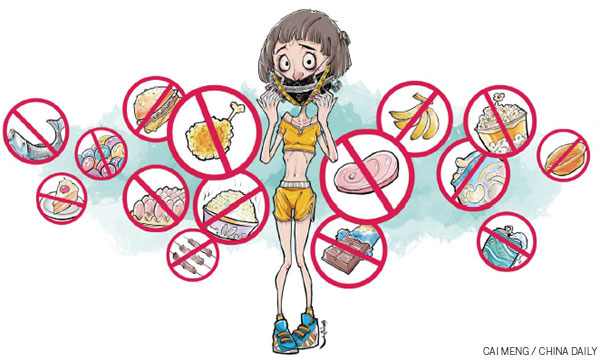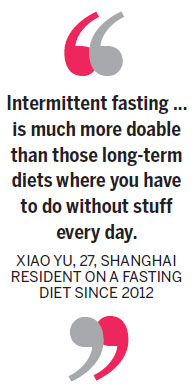The fast track to longer life?
Updated: 2015-08-21 08:19
By Liu Zhihua(China Daily Europe)
|
|||||||||||
More chinese taking on diets that drastically limit food intake
For some people the words fasting and self-denial conjure up negative images, ones of pallid, listless bodies and of hard-to-bear sacrifice that are out of tune with the zeitgeist of the me generation.
But more and more people are vouching for the physical and mental benefits that drastically cutting the body's food supply for limited, regular periods can bring, including preventing illness and disease and prolonging life.

Of course, the practice of fasting, especially as a way of increasing spiritual awareness, is far from new, being a staple of many religions going back thousands of years. All the more surprising then that in the materialistic 21st century millions are adopting intermittent fasting as a kind of secular sacrament, one that rather than enlightening them will make their bodies lighter, with all the other benefits that this is said to bring.
In China, as elsewhere, the number of intermittent fasters is growing, too. The practice is not exactly new, having been around in its modern form since at least the 1940s. However, the most recent spurt of interest in it can be traced back to a BBC television program three years ago called Eat Fast and Live Longer, in which Michael Mosley, a doctor and journalist, delivered the gospel of the intermittent fast.
Eat what you like five days a week, he declared, and you can still reduce your waistline and become healthier if on the other two days you drastically cut your daily calorie intake, consuming just one-fourth of what you normally do, the average being 500 calories for women and 600 for men.
In January 2013, five months after Eat Fast and Live Longer was broadcast, the book The Fast Diet, by Mosley and Mimi Spencer, was published and became a best-seller. In the ensuing two and a half years intermittent fasting has turned into a worldwide publishing phenomenon, with hundreds of books on the subject coming out in English alone. A Chinese translation of The Fast Diet was published 14 months ago.
In June, in a story headed "Five day 'fasting' diet slows down ageing and may add years to life", the Daily Telegraph in London reported that researchers at the University of Southern California had developed a nutritional regimen that calls on followers to eat 34 to 54 percent of their normal calorie intake on five days at least four times a year, with a specific composition of nutrients.
A trial of 19 humans placed on the so-called fasting mimicking diet once a month for five days had shown decreased risk factors and biomarkers for aging, diabetes, cancer and heart disease, and no major adverse side effects, the Telegraph quoted the researchers as saying.

Last month in China the topic of healthy eating got a fresh dollop of attention thanks to a publicity stunt in which dozens of Western men dressed as Spartan warriors in scanty, figure-hugging costumes, each holding a bag of salad, marched through busy streets in central Beijing.
A local food delivery service that sells salad that it says contains only about 100 to 700 calories each had hired the models to deliver products to customers, celebrating the company's one-year anniversary. When police broke up the gathering, the event grabbed headlines around the world.
The introduction of Chai Zheng, 29, of Beijing, to the "5:2 diet" plan was a little less dramatic. She says she started intermittent fasting soon after she came across a book on the subject in summer last year.
"When you really think about it, what the book says makes absolute sense," she says. "If you keep eating a lot of food, the digestive tract cannot remain clean and the body is overtaxed."
One of those in the vanguard of the current crop of intermittent fasters was Xiao Yu, 27, of Shanghai, who went on an intermittent fast diet in 2012, when she was on a postgraduate program in the United States.
Xiao says she had always had an appetite that was too big to be healthy, and that with the pressure of schoolwork and a sedentary collegiate lifestyle it was not only her academic knowledge that continued to expand but her waistline as well.
When she first heard about intermittent fasting, she says, she was immediately drawn to it.
"It has always been impossible for me to remain focused when I am hungry, and that's what I liked about intermittent fasting as soon as I found out about it. It lets me eat normally when I'm fasting and is much more doable than those long-term diets where you have to do without stuff every day."
In her diet regimen, she was allocated three consecutive days in a month to fast, during which she was limited to consuming salad or juice.
Because she was busy with studies, she says, she had limited energy to prepare low-calorie food, so she often bought bottled juice online to fulfill her needs.
In the US the bottled juice industry has long been geared to the needs of those on fasts, serving products that are low in calories and high in nutrition, Xiao says.
When Xiao first took up intermittent fasting, the desire for food was torture, she says, more in the realms of psychological craving rather than physical need.
However, after several months on her three-days-a-month fasting regimen, the benefits began to become clear, she says.
Not only did she lose weight, but "my sense of smell and taste became sharper, and I would subconsciously abstain from oily and salty food", Xiao says.
Her digestion and bodily functions also improved markedly, she says.
But when she returned to China in 2013, similar products were difficult to find, and she had to modify her fasting plan.
One day a week she would satiate herself with regular food in the morning, eat little at lunchtime, and have a vegetable salad or no food in the evening.
Early last year, she says, she noticed that in China juice makers seemed to be catching up with their counterparts in the US, offering greatly broadened ranges of juices.
Xiao says that while she prefers to prepare salads and make diet supplement juices herself, she relies on bottled juice when she is fasting because of the convenience.
Many of her acquaintances, mostly women, are also following intermittent fasting diets, she says, and many of her friends have expressed an interest in the idea, even if most who have tried putting it into action have found it hard to adhere to.
"It is about keeping healthy rather than just about losing weight," she says.
Du Hei, 40, who lives in Xi'an, Shaanxi province, says he and his wife have eaten light food at weekends for more than six years.
When they are home at the weekend they avoid meat and oil and often have lightly boiled vegetables dressed with a little salt and sauce, and steamed yams and potatoes, because such food is low in calories and high in rich fibers, Du says.
The reason they eat low-fat, low-calorie food at the weekend is that they eat too many calories on weekdays. A multitude of rich fibers at the weekend will cleanse their digestive tracts, and taking in fewer calories will help them control their waistlines, he says.
Du says TV health experts who say people should consume more vegetables and less meat inspired their light diet.
The Taoist tradition of bigu, literally avoiding grains, a fasting technique associated with achieving immortality in Taoism, also inspired them, Du says. In fact, many Chinese people who hear about intermittent fasting associate it with bigu.
It was only recently that Du could attach the moniker intermittent fasting to his regimen when a relative told him about the BBC documentary film and the 5:2 diet.
"But it doesn't really matter how I started this healthy eating pattern," he says. "What matters are the benefits I can show for it."
Over the years, he says, his cholesterol levels and blood pressure have remained normal.
Hilary Hu, 26, a housewife in Shanghai, says she has been buying bottled cold-pressed juice regularly to replace meals since last summer.
She is enthusiastic about keeping fit, she says, and since her college years she has tried various ways to "cleanse my body and revitalize my health".
Four years ago she tried bigu after she read a book on how some Japanese cancer patients practice it, and in doing so increase their longevity. But it was too difficult for her to abstain from food completely and have water only for a whole day, she says.
The hunger pangs were unbearable and she could hear her stomach rumbling all day, and gradually she started having small quantities of noodles to relieve the hunger while practicing bigu.
When she heard about intermittent fasting last year, she took it up without a second thought, she says.
"Intermittent fasting sounds just like bigu, but it's easier to practice. In fact, it's like an upgraded, user-friendly version of bigu."
Hu says she has practiced intermittent fasting for about a year and also does yoga, and believes she is becoming healthier. She used to suffer from indigestion and neck ache, but now these have disappeared, and she is stronger.
Chai in Beijing, says she is still on an intermittent fast, but that it is a little different to what she had expected.
She bought bottled fresh juice online to fast not because she wanted to "cleanse my body", she says, but because she wanted to be healthier. But soon she found the juice upset her stomach, so she started eating porridge instead.
However, some nutritionists and health professionals do not share the unbridled enthusiasm that adherents such as Chai show for intermittent fasting.
Ma Guansheng, a nutritionist with the School of Public Health at Peking University, is cautious in talking about the health benefits that intermittent fasting can deliver.
"It's true that having low-calorie food regularly will help you lose weight, but it's stretching it to say such a diet can reduce the risk of disease and revitalize health. Any such assertions need to be based on solid experiments and research."
Britain's National Health Service takes an even more skeptical view. It brands the 5:2 regimen as a fad diet and says that "there is little or no evidence" to support claims that it can protect against disease and prolong life.
liuzhihua@chinadaily.com.cn
(China Daily European Weekly 08/21/2015 page24)
Today's Top News
No cyanide detected from Tianjin river section with fish deaths
Greek PM to resign, seek snap election in September
Britain to reopen embassy in Tehran this weekend
Chemical plants to be relocated in blast zone
IMF to extend current SDR basket until September 2016
China-Russia joint military drill no reason for concern
Rebels in Ukraine's Donetsk plan referendum on joining Russia: media
Man in yellow shirt is Bangkok bomber: Police
Hot Topics
Lunar probe , China growth forecasts, Emission rules get tougher, China seen through 'colored lens', International board,
Editor's Picks

|

|

|

|

|

|






